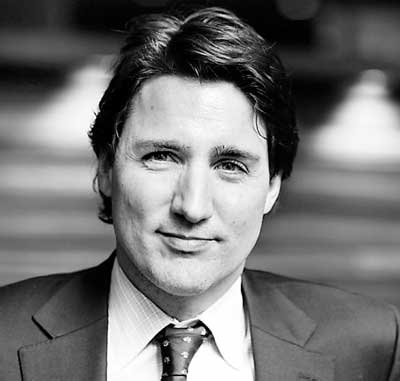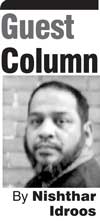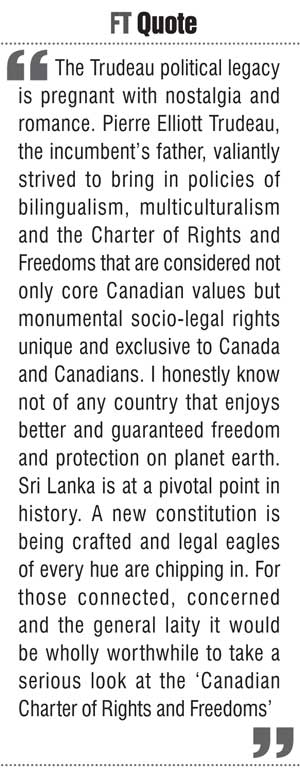Thursday Mar 06, 2025
Thursday Mar 06, 2025
Saturday, 23 January 2016 00:00 - - {{hitsCtrl.values.hits}}
 The year 2015 was eventful for both Sri Lanka and Canada. Both countries elected new leaders to take the nations forward, hopefully. The eventual winners were up against formidable contenders. The new winners promised radical departures from the status quo.
The year 2015 was eventful for both Sri Lanka and Canada. Both countries elected new leaders to take the nations forward, hopefully. The eventual winners were up against formidable contenders. The new winners promised radical departures from the status quo.
Maithripala Sirisena and his combined coalition promulgated a manifesto titled “A compassionate “Maithri” governance” dubbed in the vernacular as Yahapalanaya. The immediate aftermath of this incredible victory enthroning President Maithripala Sirisena was conspicuously palpable.
Brand promise
Let’s digress for a minute from the subject matter. Students of marketing study what’s known as a brand promise. It’s a crucial, significant and vital element of a brand. It’s all about experiences and benefits associated with a product in its current and prospective consumers’ minds. Best brands deliver on their brand promise. It’s the holistic and superlative performance of the brand that determines its success and sustainability. Consumers develop expectations for the brand. They sincerely trust that the brand will deliver on those expectations. Good brands follow through on their commitments to consumers. There’s nothing that erodes confidence in a brand (or a leader) quite like undelivered promises.
This principle is universal and widely applicable for ethical mind capture as an essential prerequisite for sales and marketing. This is how the process of conveying and convincing takes shape in the actual dynamics of business, more specifically marketing. In the last couple of decades politicians have increasingly resorted to marketing and necessarily so. Not all candidates are marketable yet most try. Just as brand Apple has a certain brand promise so did brand JFK, JR, Obama and Trudeau.
In Sri Lanka the letters JR may be considered a powerful brand, for sure I do. Some may disagree vehemently. In my opinion it had and still has high brand recognition and promise. Not just local but global brand recognition. He was our first President – the right honourable J.R. Jayewardene. The old fox had unique brand attributes. He was bold, courageous with a vision. He wanted to reintegrate Sri Lanka with the evolving world fraternity after years of self-imposed isolation. 
His international standing was established. To get an audience with President Ronald Reagan as an equal and engage with him intimately was a definite first at that time. Exchanging sharp wits with repartees in the White House lawn completes the story. This was JR. His connection with the then Iron Lady Margaret Thatcher was even stronger. The liberal international trade he envisioned worked for Sri Lanka and the legacy continues. No doubt the bloke was a polarising figure. He earned the ire and vilification of some, nonetheless his credentials were indisputable. In retrospect and after five more Executive Presidents, his positives far outweigh the negatives.
The Trudeau brand
Forty-three-year-old Justin Trudeau, son of famous former Prime Minister Pierre Trudeau, became Canada’s 23rd Prime Minister in October of 2015. The Trudeau brand resonates extremely well within Canada, if I may add, with a twinge of symphonic romance. His iconic father bequeathed an enviable legacy. I dare say it’s entrenched and is  rendered virtually unsurpassable.
rendered virtually unsurpassable.
The senior Trudeau painstakingly instilled true Canadian values which we present Canadians cherish. Freedom, equality, inclusiveness, respect for cultural differences, commitment to social justice, compromise and co-existence, sponsoring refugees are values that are sacrosanct. None dare fiddle with it.
In which country would you see the Prime Minister taking time off to be at the airport welcoming refugees? Well, it happens in Canada. He, Justin Trudeau, established the most diverse cabinet Canada has ever seen. It had 15 men and 15 women. They were from the minorities, first nations and former refugees. Justin famously said “A cabinet that looks like Canada”. Does the Sri Lankan Cabinet truly represent Sri Lanka? This is a question I keep asking myself despite its jumbo size.
This is not an attempt to lash at Sri Lanka. My make-up is Sri Lankan and that’s my country of birth. This can never be taken away. I eat and drink Sri Lankan even though I live in Canada. Even my dreams are made in Sri Lanka.
Like most Sri Lankan expatriates we are opposed to the blatant opportunism, demagoguery, pseudo-melodrama, profligacy, corruption, obfuscation and the rest that goes with it. In the recent years we have witnessed more of the same. We are opposed to attempts by some politicians to distort facts and make a mockery of the general public’s intelligence and integrity. This becomes very clear when one pays close attention to rhetoric emanating from both sides of the aisle – “Apiwa gonata andanna epa”.
Serving people is a monumental trust. Even if we can have 10% of the 225 strong Sri Lankan Parliament understand and support this noble concept, we could achieve remarkable things for Sri Lanka. All is not lost. We hope President Maithripala Sirisena and Prime Minister will be able to march forward and countenance all impediments and achieve their noble objectives of communal harmony and economic prosperity.
Ending divisive politics
Justin Trudeau openly promised to end a decade of divisive politics spearheaded by veteran senior politician and then incumbent Stephan Joseph Harper. He vowed to unite Canadians and embrace diversity. His campaign took flight on a promise of “Real Change”. His eventual triumph reverberated all across Canada.
The period of Harper was doubtless indelibly divisive. He rapidly and boldly took Canada where no Prime Minister in living history had taken the nation. It was a freighting rollercoaster if you were a Muslim. He exploited the slightest aberration within and outside to optimally further his agenda with alacrity.
Harper relentlessly laboured to instil deliberate distortions of the Muslim faith. Islamism was his favourite, unjustly extending a suffix for purposes of pure mischief. Did he have any idea how Muslims felt at these repugnant misrepresentations?
The writer being a student of Islam failed to comprehend any of these allegations and distortions. They were nothing but existential Western constructs to which he appended his unique Harper brand. The binary language peaked during and before the election. It was fraught with anxiety and trepidation. Finally sanity prevailed and providence too had its role.
The near 10-year Harparist rule heralded a sharp turn to the right. A liberal nation committed to peacekeeping suddenly let lose in uncharted waters. She was suddenly negotiating turbulent waters not knowing why she was put there in the first place. Canada callously withdrew from the Kyoto Protocol, opted out of the UN Convention to Combat Desertification and over-zealously supported the rogue state of Israel in the face of prima-facia evidence of grotesque human rights abuse.
Canada had always postulated a balanced approach in the thorny Middle East conflict. A safe state for Palestinians and the s Israeli’s is what she always maintained. All of this had a major shift under Harper. Suddenly Harper was head over heels in love with Israel, this made him virtually blind.
Harper abandoned the country’s cherished traditions of international diplomacy. He made wedge politics a fine art. He confused and conflated the issue of the Muslim hijab for petty political reasons. He’s definitely destined to go down in history as the only Prime Minister to have conducted uninterrupted and serious research on Islamic wardrobes.
Historical shift in Sri Lanka
In Sri Lanka too it was quite a historical shift. It was the first time an incumbent President lost a presidential election. A war-winning President dethroned. Absolute bewilderment reigned. President Sirisena swept to power principally on a platform of good governance – Yahapalanaya. Minorities voted en-masse for Maithripala Sirisena. Certain experts held the view if not for minorities Maithripala Sirisena would have lost. There is lot of truth in this analysis though vehemently denied by the establishment. This is understandable.
Muslims became victims of electoral strategy in Sri Lanka. This was another first for Sri Lanka. Four Muslims were killed and scores injured and extensive damage caused to property during violence in the south. It was triggered by a militant Buddhist organisation receiving tacit patronage and succour from the regime. They were an integral part of the aggrandised political outfit of the Rajapaksa clan.
Sri Lankan democracy had been fed with such toxicity in the name of freedom and free speech. A leader upon being perceived as minority friendly would automatically plummet in rankings. Isn’t this an unhealthy trend that makes democracy exclusive? It seems survival in Sri Lankan politics is linked to quick and drastic decisions regardless of consequences. The politically vulnerable and immature had no choice but to embrace this oddity or perish.
Isn’t this a gross distortion of democracy? Unalloyed fodder for future pseudo ultra-nationalists harbouring political ambitions to make their entry with a far destructive ideology. It seems this kind of pernicious ideology has become invisible export items for Sri Lanka. Donald Trump the contemporary proselytised apostle of neo-fascism is all over the media today brandishing this kind of “Made in Sri Lanka” evil. Who knew Donald Trump of all people would sport a “Made in Sri Lanka” tag?
Mahinda Rajapaksa the hero who defeated “Tamil separatism” had to align conspicuously with the Sinhalese at the detriment of letting down the minorities. He costumed trappings, paraphernalia, rhetoric and behaviour consistent for a Sinhalese reinforcement and renaissance. Never were the Muslims of Sri Lanka more seriously jolted. They were openly threatened. Mahinda Rajapaksa delivered it in grand Hollywood style, reminiscent of the blockbuster “Dirty Harry” where Clint Eastwood utters the famous line “Do I feel lucky”.
Does this make Mahinda Rajapaksa a racist? Does Stephan Harper become a racist for all his ill-founded propensities? Absolutely not. These were nothing but unfortunate happenings of a misguided people. Moments of absolute and shameful weakness. Despite repeated red flashing conveying danger and ill-boding, the heedless go ahead with execution due to uncontrollable political inebriation. Besides, the pernicious embrace of the devil was simply too much.
Both Mahinda Rajapaksa and Stephan Harper could have extended their political life significantly, especially the former. He was a war-winning hero, let not anyone take that from him. If only these gentleman had insight, essentially derived from authentic scriptural exegesis, such wisdom would have shed light on the priceless values of inclusiveness, compassion and accommodation and a wholly different outcome envisaged. Siddhartha Gautama and Jesus son of Mary did their jobs without a blemish, the apostles erred.
History has it that Sri Lanka had witnessed dubious electoral theatrics before. Full-blown Pukka Sahibs were squeezed into national attire overnight with well-defined political objectives. Those that unconscionably relegated Queen’s English as a means of political blueprint to appeal and appease strategic segments of a demography for nothing but petty political mileage. The result – we created a work force struggling to communicate well in English when it was most needed. Let’s not forget two youth uprisings had a common trapping of dispossession attached to their call.
The above bespeaks volumes of misplaced values of our leaders and their cheap contortions of democracy for self-serving purposes. I am painfully reminded of a witty statement of the great English play-write George Bernard Shaw who once said “Democracy is government of the fools, for the fools, by the fools”.
Beating fear with hope
In Montreal Prime Minister elect Justin Trudeau said in October 2015: “I will be the prime minister of all Canadians,” after winning a historic Liberal majority government. He further said: “We beat fear with hope. We beat cynicism with hard work. We beat negative, divisive politics with a positive vision that brings Canadians together.” These words still echo in my ears. Words of a true leader.
Justin Trudeau’s Liberal Party was trailing third place 11 weeks before the election. A sudden ground swell galvanised the people. The Liberal Party won 184 of Parliament’s 338 seats in the general election. Justin Trudeau also said “Tonight Canada is becoming the country it was before... Most of all we defeated the idea that Canadians should be satisfied with less”.
The Trudeau political legacy is pregnant with nostalgia and romance. Pierre Elliott Trudeau, the incumbent’s father, valiantly strived to bring in policies of bilingualism, multiculturalism and the Charter of Rights and Freedoms that are considered not only core Canadian values but monumental socio-legal rights unique and exclusive to Canada and Canadians. I honestly know not of any country that enjoys better and guaranteed freedom and protection on planet earth.
Sri Lanka’s pivotal point
Sri Lanka is at a pivotal point in history. A new constitution is being crafted and legal eagles of every hue are chipping in. For those connected, concerned and the general laity it would be wholly worthwhile to take a serious look at the ‘Canadian Charter of Rights and Freedoms’.
The Trudeau name resonates with benign immortality not just in Canada but throughout the Americas and beyond. Sri Lanka may benefit from Trudeau senior’s vision and philosophy vis-à-vis racial harmony and pluralism. Pierre Elliot Trudeau famously said: “In Canada there are two official languages, but no official culture.” He also said: “Bilingualism is not an imposition on the citizens but an imposition on the state.” Regarding separatism he said: “I am trying to put Quebec in its place and the place of Quebec is in Canada.” “You just cannot cut a country in two anymore than you can cut a human being in two. If you do, you do not have two human beings; you have a corpse.”
Insha Allah we want to preserve and protect Canada and our new leader. He is a true representative of the people, such people need to be protected at all cost. We the people are relieved that the true soul and identity of Canada had been reclaimed. Trudeau’s triumph is the people’s triumph.
There is the West, then there is the rest and there is Canada.
(The writer is a Canadian citizen of Sri Lankan descent. He is a freelance journalist with a keen interest in PRIME – Politics, Religion, Islam, Marketing and Economics. He is a Graduate of the Chartered Institute of Marketing, UK. Also holds an MBA from Vinayaka Mission’s Research Foundation University, India.)
Discover Kapruka, the leading online shopping platform in Sri Lanka, where you can conveniently send Gifts and Flowers to your loved ones for any event including Valentine ’s Day. Explore a wide range of popular Shopping Categories on Kapruka, including Toys, Groceries, Electronics, Birthday Cakes, Fruits, Chocolates, Flower Bouquets, Clothing, Watches, Lingerie, Gift Sets and Jewellery. Also if you’re interested in selling with Kapruka, Partner Central by Kapruka is the best solution to start with. Moreover, through Kapruka Global Shop, you can also enjoy the convenience of purchasing products from renowned platforms like Amazon and eBay and have them delivered to Sri Lanka.
Discover Kapruka, the leading online shopping platform in Sri Lanka, where you can conveniently send Gifts and Flowers to your loved ones for any event including Valentine ’s Day. Explore a wide range of popular Shopping Categories on Kapruka, including Toys, Groceries, Electronics, Birthday Cakes, Fruits, Chocolates, Flower Bouquets, Clothing, Watches, Lingerie, Gift Sets and Jewellery. Also if you’re interested in selling with Kapruka, Partner Central by Kapruka is the best solution to start with. Moreover, through Kapruka Global Shop, you can also enjoy the convenience of purchasing products from renowned platforms like Amazon and eBay and have them delivered to Sri Lanka.